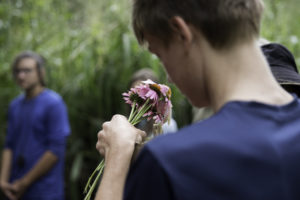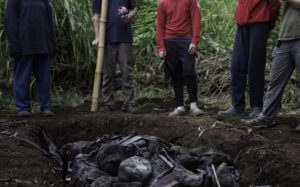By: Clementine Wilson, Adolescent Field Manager
Pacific Quest hosted our annual Winter Solstice celebration for our students and employees last month! We were able to hold it on the actual date of the Solstice – marking the shortest day of the year.

Students preparing for the Winter Solstice celebration
““Solstice” comes from two Latin words: sol meaning “sun” and sistere meaning “to stand still” because it appeared as though the sun and moon had stopped moving across the sky. This longest night of the year, followed by a renewal of the sun, demonstrates the cyclical order of the cosmos. In this way, celebrating the solstice can be a beautiful remembrance that our lives are part of a larger order, always changing, always renewing.”
The solstice holiday focuses on the natural cycles of life, connection to the land, and the winter harvest. Program Guides led students through themed land lessons and activities in camp leading up to the meal. The students choreographed and performed a “Mele Kalikimaka” hula dance, a live performance of the Lorax, and a guided meditation walk over to the imu where the meal was prepared. They ended the activities with a gratitude circle before sitting down to eat together.

Preparing the imu, traditional underground oven
Sharing food, an important part of any celebration, is particularly meaningful during the solstice, as it represents faith in the return of the sun and the harvest. We prepared pork, turkey and tofu in our imu, a traditional Hawaiian underground oven. To make our imu, we dug a hole in the ground and placed rocks and wood inside. Then a fire was started, creating a bed of coals and heating up the rocks. Next, banana leaves and other plant materials were placed in the pit, which created steam. The foods to be cooked were placed inside, and more plant materials got piled on top, followed by water soaked burlap sacks. Finally, everything was covered and weighted down with rocks and dirt to prevent steam from escaping. The food steamed in the imu for hours, until it was moist and tender. In addition, we used much of our own PQ harvest (especially our kabocha squash) as part of this meal. We enjoyed a delicious feast and it was so beautiful and inspiring to see the students and guides take time to prepare for this celebration. Throughout the day I witnessed a wonderful balance of laughter and reverence!